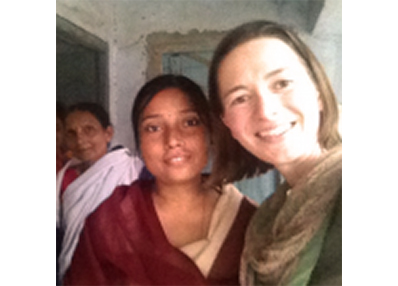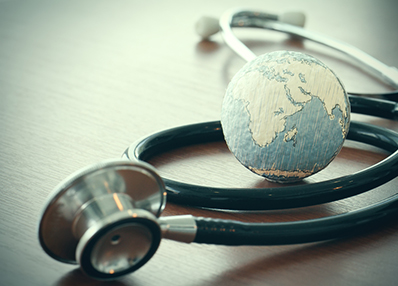
- Your MPH Program
- Schools
- Concentrations
- Blog
- Request Info From Schools
by Rebecca Lubitz-Marchena of Berkeley’s School of Public Health
 Several years ago, I was in the home of an expecting mom in Northern India. The village was two hours from the closest maternity hospital. Her home had a tin roof and a mud floor, somehow swept spotlessly to a shiny brown. She had two pots, a water jug. The cot that she and her family slept on was the only furniture. She, her mother and three kids, then five neighbors and two chickens all piled onto the cot to show me the Healthy Pregnancy Video on her phone. We watched a 2-minute animation about eating healthy, drinking clean water and saving a little money for the big day. During those two minutes, we sat rapt. The kids were button lipped. Not even the chickens clucked. When it was over, a chorus of voices said, “Show it again, show it again.” That was the moment when I realized the importance of technology in global health.
Several years ago, I was in the home of an expecting mom in Northern India. The village was two hours from the closest maternity hospital. Her home had a tin roof and a mud floor, somehow swept spotlessly to a shiny brown. She had two pots, a water jug. The cot that she and her family slept on was the only furniture. She, her mother and three kids, then five neighbors and two chickens all piled onto the cot to show me the Healthy Pregnancy Video on her phone. We watched a 2-minute animation about eating healthy, drinking clean water and saving a little money for the big day. During those two minutes, we sat rapt. The kids were button lipped. Not even the chickens clucked. When it was over, a chorus of voices said, “Show it again, show it again.” That was the moment when I realized the importance of technology in global health.
—Caricia Catalani, Dr.P.H., M.P.H., Lecturer, Communication in Public Health, UC Berkeley On-Campus/Online Master’s in Public Health

After covering the changing landscape of global health as the first in our global health series, here we focus on the role of technology in the field. As technology becomes more far reaching, it is increasingly relevant, with organizations such as the Global Health Technologies Coalition (supported in part by the Bill and Melinda Gates Foundation) advocating for policies that advance global health research and development. Through TV, radio and now mobile phones, putting knowledge in the hands of those who live in remote areas is more viable through information communication technology (ICT) for health, also known as e-health. According to an Organisation for Economic Co-Operation and Development (OECD) blog post, ICT is the next revolution in health, following surgery, anesthesia and the like.
Take Liberia, where there has been a surge of mental health issues as a result of a civil war and a heavy toll from the Ebola epidemic. Enter mHero, a open-source application that employs SMS (text messaging) with interactive voice response. The tool was originally used to send information to and from front-line Ebola health workers; the second iteration now helps gather vital population-based health information and is used to assess depression and other disorders.
There has also been renewed focus on prioritizing “frugal technologies”: cost-effective tools developed specifically to cope in local conditions, according to The Lancet article Technologies for Global Health. A far cry from mobile software, this type of innovation takes shape as the eRanger motorbike ambulance, an affordable alternative to large, expensive ambulances common in high-income countries. The motorbike is better equipped to navigate rugged rural roads and “is commonly used in Africa, modified to work with a stretcher sidecar that can carry one or two people. A WHO study shows that the eRanger has contributed to a reduction in maternal mortality in Malawi.”
According to the Lancet article, “Television and radio, which are used by more than 75 percent of people in low-income and middle-income countries, can be the best medium for transmission of health messages.“ After recounting her experience with e-health in India, Dr. Catalani posits, “Today, there are more mobile phones than people on the globe. The world is changing as the technology that used to be only for the well-heeled elite of the world is now common among the 2.7 billion people who live on less than $2-a-day. Put another way, people who do not own a single book, who do not have a single health pamphlet, now have the ability to watch an animated video, in their language, about health and wellness. As technology companies around the world, and especially in the Bay Area, explore the leading edge of what’s possible in artificial intelligence, robotics, genetics and neuroscience, we have the opportunity to explore the trailing edge of what’s possible.”
Do you have experience working on the technology side of global health? Tell us about your experience in the comments and we may contact you to share your story on our blog. Stay tuned for our next installment in our global health series.
This article was originally published on the UC Berkeley On-Campus/Online MPH Blog. View the full article here: http://onlinemph.berkeley.edu/
Back to Main Blog PageAre you ready to learn more? Request Info from Schools